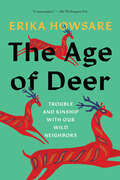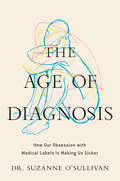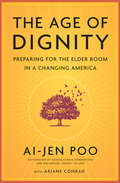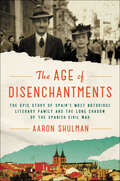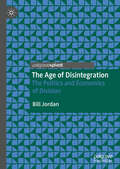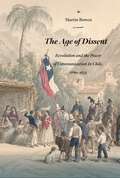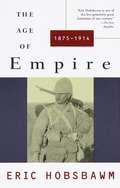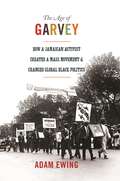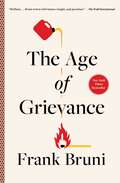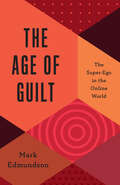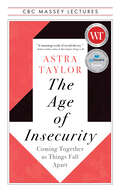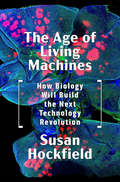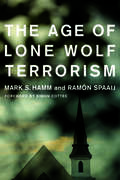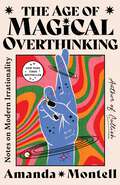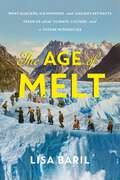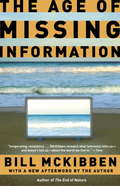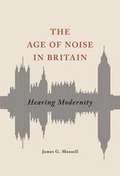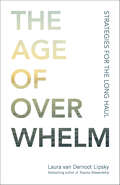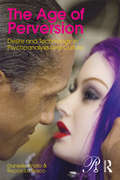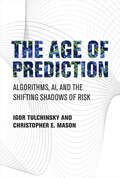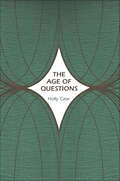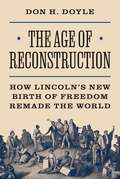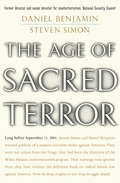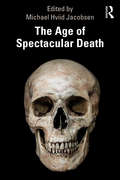- Table View
- List View
The Age of Deer: Trouble and Kinship with our Wild Neighbors
by Erika HowsareA masterful hybrid of nature writing and cultural studies that investigates our connection with deer—from mythology to biology, from forests to cities, from coexistence to control and extermination—and invites readers to contemplate the paradoxes of how humans interact with and shape the natural worldDeer have been an important part of the world that humans occupy for millennia. They&’re one of the only large animals that can thrive in our presence. In the 21st century, our relationship is full of contradictions: We hunt and protect them, we cull them from suburbs while making them an icon of wilderness, we see them both as victims and as pests. But there is no doubt that we have a connection to deer: in mythology and story, in ecosystems biological and digital, in cities and in forests. Delving into the historical roots of these tangled attitudes and how they play out in the present, Erika Howsare observes scientists capture and collar fawns, hunters show off their trophies, a museum interpreter teaching American history while tanning a deer hide, an animal-control officer collecting the carcasses of deer killed by sharpshooters, and a woman bottle-raising orphaned fawns in her backyard. As she reports these stories, Howsare&’s eye is always on the bigger picture: Why do we look at deer in the ways we do, and what do these animals reveal about human involvement in the natural world? For readers of H is for Hawk and Fox & I, The Age of Deer offers a unique and intimate perspective on a very human relationship.
The Age of Diagnosis: How Our Obsession with Medical Labels Is Making Us Sicker
by Suzanne O'SullivanFrom a neurologist and the award-winning author of The Sleeping Beauties, a meticulous and compassionate exploration of how our culture of medical diagnosis can harm, rather than help, patients.We live in an age of diagnosis. Conditions like ADHD and autism are on the rapid rise, while new categories like long Covid are being created. Medical terms are increasingly used to describe ordinary human experiences, and the advance of sophisticated genetic sequencing techniques means that even the healthiest of us may soon be screened for potential abnormalities. More people are labeled "sick" than ever before—but are these diagnoses improving their lives?With scientific authority and compassionate storytelling, neurologist Suzanne O'Sullivan argues that our obsession with diagnosis is harming more than helping. It is natural when we are suffering to want a clear label, understanding, and, of course, treatment. But our current approach to diagnosis too often pathologizes difference, increases our anxiety, and changes our experience of our bodies for the worse.Through the moving stories of real people, O'Sullivan compares the impact of a medical label to the pain of not knowing. She explains the way the boundaries of a diagnosis can blur over time. Most importantly, she calls for us to find new and better vocabularies for suffering and to find ways to support people without medicalizing them.
The Age of Dignity: Preparing for the Elder Boom in a Changing America
by Ariane Conrad Ai-jen PooOne of Time&’s 100 most influential people &“shines a new light on the need for a holistic approach to caregiving in America . . . Timely and hopeful&” (Maria Shriver). In The Age of Dignity, thought leader and activist Ai-jen Poo offers a wake-up call about the statistical reality that will affect us all: Fourteen percent of our population is now over sixty-five; by 2030 that ratio will be one in five. In fact, our fastest-growing demographic is the eighty-five-plus age group—over five million people now, a number that is expected to more than double in the next twenty years. This change presents us with a new challenge: how we care for and support quality of life for the unprecedented numbers of older Americans who will need it. Despite these daunting numbers, Poo has written a profoundly hopeful book, giving us a glimpse into the stories and often hidden experiences of the people—family caregivers, older people, and home care workers—whose lives will be directly shaped and reshaped in this moment of demographic change. The Age of Dignity outlines a road map for how we can become a more caring nation, providing solutions for fixing our fraying safety net while also increasing opportunities for women, immigrants, and the unemployed in our workforce. As Poo has said, &“Care is the strategy and the solution toward a better future for all of us.&” &“Every American should read this slender book. With luck, it will be the future for all of us.&” —Gloria Steinem &“Positive and inclusive.&” —The New York Times &“A big-hearted book [that] seeks to transform our dismal view of aging and caregiving.&” —Ms. magazine
The Age of Disenchantments: The Epic Story of Spain's Most Notorious Literary Family and the Long Shadow of the Spanish Civil War
by Aaron Shulman“An intriguing narrative of literary ambition and family dysfunction—betrayal, drug addiction, and madness—that begins during the Spanish Civil War.” —Amanda Vaill, The New York Times Book ReviewIn this absorbing and atmospheric historical narrative, journalist Aaron Shulman takes us deeply into the circumstances surrounding the Spanish Civil War through the lives, loves, and poetry of the Paneros, Spain’s most compelling and eccentric family, whose lives intersected memorably with many of the most storied figures in the art, literature, and politics of the time—from Neruda to Salvador Dalí, from Ava Gardner to Pablo Picasso to Roberto Bolaño.Weaving memoir with cultural history and biography, and brought together with vivid storytelling and striking images, The Age of Disenchantments sheds new light on the romance and intellectual ferment of the era while revealing the profound and enduring devastation of the war, the Franco dictatorship, and the country’s transition to democracy.A searing tale of love and hatred, art and ambition, and freedom and oppression, The Age of Disenchantments is a chronicle of a family who modeled their lives (and deaths) on the works of art that most inspired and obsessed them and who, in turn, profoundly affected the culture and society around them.“A valuable primer on the ways literature intertwined with politics during Franco’s reign.” —Rigoberto González, Los Angeles Times“In this sweeping, ambitious debut, journalist Shulman offers a group biography of a family indelibly marked by the Spanish Civil War . . . Prodigiously researched and beautifully written.” —Publishers Weekly (starred review)
The Age of Disintegration: The Politics and Economics of Division
by Bill JordanThis book addresses the disintegration of collective units of all kinds, under the twin pressures of economic globalisation and technological automation. At the level of super-states, the constituent nations of the European Union and the former Soviet Union, and of the United Kingdom, have demonstrated this dynamic; and their constituent groups, associations and communities have done so too. The author analyses the causes and consequences of these processes, at the global, national and local levels, the significance of increased mobility and migration, and the politics of resistance to some damaging effects. He recommends ways in which public policy can offset some of the latter, including radical changes in tax-benefits systems, already being trialled in several countries worldwide.
The Age of Dissent: Revolution and the Power of Communication in Chile, 1780–1833 (Diálogos Series)
by Martín BowenThe Age of Dissent argues that the defining feature of the Age of Revolutions in Latin America was the emergence of dissent as an inescapable component of political life. While contestation and seditious ideas had always been present in the region, never before had local regimes been forced to consider radical dissension as an unavoidable dimension of politics. Focusing on urban Chile between the first anticolonial conspiracy of 1780 and the consolidation of an authoritarian regime in 1833, the book argues that this revolution was caused by how people practiced communication and framed its power.
The Age of Empire 1875-1914
by Eric HobsbawmDiscusses the evolution of European economics, politics, arts, sciences, and cultural life from the height of the industrial revolution to the First World War.
The Age of Garvey: How a Jamaican Activist Created a Mass Movement and Changed Global Black Politics (America in the World #18)
by Adam EwingA groundbreaking exploration of Garveyism's global influence during the interwar years and beyondJamaican activist Marcus Garvey (1887–1940) organized the Universal Negro Improvement Association in Harlem in 1917. By the early 1920s, his program of African liberation and racial uplift had attracted millions of supporters, both in the United States and abroad. The Age of Garvey presents an expansive global history of the movement that came to be known as Garveyism. Offering a groundbreaking new interpretation of global black politics between the First and Second World Wars, Adam Ewing charts Garveyism's emergence, its remarkable global transmission, and its influence in the responses among African descendants to white supremacy and colonial rule in Africa, the Caribbean, and the United States.Delving into the organizing work and political approach of Garvey and his followers, Ewing shows that Garveyism emerged from a rich tradition of pan-African politics that had established, by the First World War, lines of communication among black intellectuals on both sides of the Atlantic. Garvey’s legacy was to reengineer this tradition as a vibrant and multifaceted mass politics. Ewing looks at the people who enabled Garveyism’s global spread, including labor activists in the Caribbean and Central America, community organizers in the urban and rural United States, millennial religious revivalists in central and southern Africa, welfare associations and independent church activists in Malawi and Zambia, and an emerging generation of Kikuyu leadership in central Kenya. Moving away from the images of quixotic business schemes and repatriation efforts, The Age of Garvey demonstrates the consequences of Garveyism’s international presence and provides a dynamic and unified framework for understanding the movement, during the interwar years and beyond.
The Age of Grievance
by Frank BruniNEW YORK TIMES BESTSELLER • &“Brilliant...Bruni writes with humor, insight, and precision.&” —Wall Street Journal • &“The best prescription for our redemption.&” —The New York Times • &“A wise and humane book for our foolish and cruel era.&” —Jonathan Haidt, author of The Anxious Generation From bestselling author and longtime New York Times columnist Frank Bruni comes a lucid, powerful examination of the ways in which grievance has come to define our current culture and politics, on both the right and left.The twists and turns of American politics are unpredictable, but the tone is a troubling given. It&’s one of grievance. More and more Americans are convinced that they&’re losing because somebody else is winning. More and more tally their slights, measure their misfortune, and assign particular people responsibility for it. The blame game has become the country&’s most popular sport and victimhood its most fashionable garb. Grievance needn&’t be bad. It has done enormous good. The United States is a nation born of grievance, and across the nearly two hundred and fifty years of our existence as a country, grievance has been the engine of morally urgent change. But what happens when all sorts of grievances—the greater ones, the lesser ones, the authentic, the invented—are jumbled together? When people take their grievances to lengths that they didn&’t before? A violent mob storms the US Capitol, rejecting the results of a presidential election. Conspiracy theories flourish. Fox News knowingly peddles lies in the service of profit. College students chase away speakers, and college administrators dismiss instructors for dissenting from progressive orthodoxy. Benign words are branded hurtful; benign gestures are deemed hostile. And there&’s a potentially devastating erosion of the civility, common ground, and compromise necessary for our democracy to survive. How did we get here? What does it say about us, and where does it leave us? The Age of Grievance examines these critical questions and charts a path forward.
The Age of Guilt: The Super-Ego in the Online World
by Mark EdmundsonHow Freud&’s concept of the super-ego can help us to understand the harsh cultural climate of the digital age Cancellation, scapegoating, raving on Twitter. How did the Internet, which began as a place for open thought and exchange, become a forum for cruelty and judgment? Can a whole culture become mentally ill? How do we understand and respond to this problem? Mark Edmundson views contemporary culture and discourse through Freud&’s concept of the super-ego, the moralistic and frequently irrational inner judge. The poet William Blake was attuned to this &“dark pressure of self-condemnation,&” and Nietzsche knew its power as well. One way to mitigate (temporarily) the self-judgment of the super-ego is to aim it outward instead, judging and even punishing others for supposed infractions. Naturally these targets fight back, resulting in a cascade of bitterness and even hatred. Edmundson traces the destructive passion of the super-ego on politics, race, gender, class, education, and more, drawing on psychological studies, classroom experience, and the work of Adam Phillips and Slavoj Žižek. Edmundson proposes ways to manage the super-ego and even to transform it into an affirmative power. In The Age of Guilt, Edmundson renews the promise of Freudian theory as he explores our unique social moment with psychological insight, humanity, and erudition.
The Age of Insecurity: Coming Together as Things Fall Apart (The CBC Massey Lectures)
by Astra TaylorThese days, everyone feels insecure. We are financially stressed and emotionally overwhelmed. The status quo isn’t working for anyone, even those who appear to have it all. What is going on? In this urgent cultural diagnosis, author and activist Astra Taylor exposes how seemingly disparate crises—rising inequality and declining mental health, the ecological emergency, and the threat of authoritarianism—originate from a social order built on insecurity. From home ownership and education to the wellness industry and policing, many of the institutions and systems that promise to make us more secure actually undermine us. Mixing social critique, memoir, history, political analysis, and philosophy, this genre-bending book rethinks both insecurity and security from the ground up. By facing our existential insecurity and embracing our vulnerability, Taylor argues, we can begin to develop more caring, inclusive, and sustainable forms of security to help us better weather the challenges ahead. The Age of Insecurity will transform how you understand yourself and society—while illuminating a path toward meaningful change.
The Age of Living Machines: How Biology Will Build The Next Technology Revolution
by Susan HockfieldFrom the former president of MIT, the story of the next technology revolution, and how it will change our lives. A century ago, discoveries in physics came together with engineering to produce an array of astonishing new technologies: radios, telephones, televisions, aircraft, radar, nuclear power, computers, the Internet, and a host of still-evolving digital tools. These technologies so radically reshaped our world that we can no longer conceive of life without them. Today, the world’s population is projected to rise to well over 9.5 billion by 2050, and we are currently faced with the consequences of producing the energy that fuels, heats, and cools us. With temperatures and sea levels rising, and large portions of the globe plagued with drought, famine, and drug-resistant diseases, we need new technologies to tackle these problems. But we are on the cusp of a new convergence, argues world-renowned neuroscientist Susan Hockfield, with discoveries in biology coming together with engineering to produce another array of almost inconceivable technologies—next-generation products that have the potential to be every bit as paradigm shifting as the twentieth century’s digital wonders. The Age of Living Machines describes some of the most exciting new developments and the scientists and engineers who helped create them. Virus-built batteries. Protein-based water filters. Cancer-detecting nanoparticles. Mind-reading bionic limbs. Computer-engineered crops. Together they highlight the promise of the technology revolution of the twenty-first century to overcome some of the greatest humanitarian, medical, and environmental challenges of our time.
The Age of Lone Wolf Terrorism (Studies in Transgression)
by Ramón Spaaij Mark HammThe lethality of lone-wolf terrorism has reached an all-time high in the United States. Isolated individuals using firearms with high-capacity magazines are committing brutally efficient killings with the aim of terrorizing others, yet there is little consensus on what connects these crimes and the motivations behind them. In The Age of Lone Wolf Terrorism, terrorism experts Mark S. Hamm and Ramón Spaaij combine criminological theory with empirical and ethnographic research to map the pathways of lone-wolf radicalization, helping with the identification of suspected behaviors and recognizing patterns of indoctrination.Reviewing comprehensive data on these actors, including more than two hundred terrorist incidents, Hamm and Spaaij find that a combination of personal and political grievances lead lone wolves to befriend online sympathizers—whether jihadists, white supremacists, or other antigovernment extremists—and then announce their intent to commit terror when triggered. Hamm and Spaaij carefully distinguish between lone wolves and individuals radicalized within a group dynamic. This important difference is what makes this book such a significant manual for professionals seeking richer insight into the transformation of alienated individuals into armed warriors. Hamm and Spaaij conclude with an analysis of recent FBI sting operations designed to prevent lone-wolf terrorism in the United States, describing who gets targeted, strategies for luring suspects, and the ethics of arresting and prosecuting citizens.
The Age of Magical Overthinking: Notes on Modern Irrationality
by Amanda MontellINSTANT NEW YORK TIMES BESTSELLER A BookPage Best Nonfiction Book of 2024 From the bestselling author of Cultish and host of the podcast Sounds Like a Cult, a delicious blend of cultural criticism and personal narrative that explores our cognitive biases and the power, disadvantages, and highlights of magical thinking. Utilizing the linguistic insights of her &“witty and brilliant&” (Blyth Roberson, author of America the Beautiful?) first book Wordslut and the sociological explorations of her breakout hit Cultish, Amanda Montell now turns her erudite eye to the inner workings of the human mind and its biases in her most personal and electrifying work yet. &“Magical thinking&” can be broadly defined as the belief that one&’s internal thoughts can affect unrelated events in the external world: think of the conviction that one can manifest their way out of poverty, stave off cancer with positive vibes, thwart the apocalypse by learning to can their own peaches, or transform an unhealthy relationship to a glorious one with loyalty alone. In all its forms, magical thinking works in service of restoring agency amid chaos, but in The Age of Magical Overthinking, Montell argues that in the modern information age, our brain&’s coping mechanisms have been overloaded, and our irrationality turned up to an eleven. In a series of razor sharp, deeply funny chapters, Montell delves into a cornucopia of the cognitive biases that run rampant in our brains, from how the &“halo effect&” cultivates worship (and hatred) of larger-than-life celebrities, to how the &“sunk cost fallacy&” can keep us in detrimental relationships long after we&’ve realized they&’re not serving us. As she illuminates these concepts with her signature brilliance and wit, Montell&’s prevailing message is one of hope, empathy, and ultimately forgiveness for our anxiety-addled human selves. If you have all but lost faith in our ability to reason, Montell aims to make some sense of the senseless. To crack open a window in our minds, and let a warm breeze in. To help quiet the cacophony for a while, or even hear a melody in it.
The Age of Melt: What Glaciers, Ice Mummies, and Ancient Artifacts Teach Us about Climate, Culture, and a Future without Ice
by Lisa BarilA thought-provoking scientific narrative investigating ice patch archaeology and the role of glaciers in the development of human culture. Glaciers figure prominently in both ancient and contemporary narratives around the world. They inspire art and literature. They spark both fear and awe. And they give and take life. In The Age of Melt, environmental journalist Lisa Baril explores the deep-rooted cultural connection between humans and ice through time. Thousands of organic artifacts are emerging from patches of melting ice in mountain ranges around the world. Archaeologists are in a race against time to find them before they disappear forever. In entertaining and enlightening prose, Baril travels from the Alps to the Andes, investigating what these artifacts teach us about climate and culture. But this is not a chronicle of loss. The Age of Melt explores what these artifacts reveal about culture, wilderness, and what we gain when we rethink our relationship to the world and its most precious and ephemeral substance—ice.
The Age of Missing Information
by Bill Mckibben"Highly personal and original . . . McKibben goes beyond Marshall McLuhan's theory that the medium is the message."----The New York Times Imagine watching an entire day's worth of television on every single channel. Acclaimed environmental writer and culture critic Bill McKibben subjected himself to this sensory overload in an experiment to verify whether we are truly better informed than previous generations. Bombarded with newscasts and fluff pieces, game shows and talk shows, ads and infomercials, televangelist pleas and Brady Bunch episodes, McKibben processed twenty-four hours of programming on all ninety-three Fairfax, Virginia, cable stations. Then, as a counterpoint, he spent a day atop a quiet and remote mountain in the Adirondacks, exploring the unmediated man and making small yet vital discoveries about himself and the world around him. As relevant now as it was when originally written in 1992-and with new material from the author on the impact of the Internet age-this witty and astute book is certain to change the way you look at television and perceive media as a whole."By turns humorous, wise, and troubling . . . a penetrating critique of technological society."-Cleveland Plain Dealer"Masterful . . . a unique, bizarre portrait of our life and times."-Los Angeles Times"Do yourself a favor: Put down the remote and pick up this book."-Houston Chronicle
The Age of Missing Information
by Bill Mckibben"Highly personal and original . . . McKibben goes beyond Marshall McLuhan's theory that the medium is the message."----The New York Times Imagine watching an entire day's worth of television on every single channel. Acclaimed environmental writer and culture critic Bill McKibben subjected himself to this sensory overload in an experiment to verify whether we are truly better informed than previous generations. Bombarded with newscasts and fluff pieces, game shows and talk shows, ads and infomercials, televangelist pleas and Brady Bunch episodes, McKibben processed twenty-four hours of programming on all ninety-three Fairfax, Virginia, cable stations. Then, as a counterpoint, he spent a day atop a quiet and remote mountain in the Adirondacks, exploring the unmediated man and making small yet vital discoveries about himself and the world around him. As relevant now as it was when originally written in 1992-and with new material from the author on the impact of the Internet age-this witty and astute book is certain to change the way you look at television and perceive media as a whole."By turns humorous, wise, and troubling . . . a penetrating critique of technological society."-Cleveland Plain Dealer"Masterful . . . a unique, bizarre portrait of our life and times."-Los Angeles Times"Do yourself a favor: Put down the remote and pick up this book."-Houston Chronicle
The Age of Noise in Britain: Hearing Modernity
by James G MansellSound transformed British life in the "age of noise" between 1914 and 1945. The sonic maelstrom of mechanized society bred anger and anxiety and even led observers to forecast the end of civilization. The noise was, as James G. Mansell shows, modernity itself, expressed in aural form, with immense implications for the construction of the self. Tracing the ideas, feelings, and representations prompted by life in early twentieth century Britain, Mansell examines how and why sound shaped the self. He works at the crux of cultural and intellectual history, analyzing the meanings that were attached to different types of sound, who created these typologies and why, and how these meanings connected to debates about modernity. From traffic noise to air raids, everyday sounds elicited new ways of thinking about being modern. Each individual negotiated his or her own subjective meanings through hopes or fears for sound. As Mansell considers the different ways Britons heard their world, he reveals why we must take sound into account in our studies of cultural and social history.
The Age of Overwhelm: Strategies for the Long Haul
by Lauren van Dernoot LipskyThere is a growing epidemic afflicting people working in social change that is rarely talked about - burnout. Laura van Dernoot Lipsky, bestselling author of Trauma Stewardship, offers The Age of Overwhelm as the salve for healing. Whether we are overwhelmed by work or school; our families or communities; caretaking for others or ourselves; or engagement in social justice, environmental advocacy, or civil service, just a few subtle shifts can help sustain us. Laura van Dernoot Lipsky, bestselling author of Trauma Stewardship, shows us how by offering concrete strategies to help us mitigate harm, cultivate our ability to be decent and equitable, and act with integrity. The Age of Overwhelm aims to help ease our burden of overwhelm, restore our perspective, and give us strength to navigate what is yet to come.
The Age of Perversion: Desire and Technology in Psychoanalysis and Culture (Psychoanalysis in a New Key Book Series)
by Danielle Knafo Rocco Lo BoscoAmerican Board and Academy of Psychoanalysis Book Prize Winner for 2018 (Theoretical Category) We have entered the age of perversion, an era in which we are becoming more like machines and they more like us.The Age of Perversion explores the sea changes occurring in sexual and social life, made possible by the ongoing technological revolution, and demonstrates how psychoanalysts can understand and work with manifestations of perversion in clinical settings. Until now theories of perversion have limited their scope of inquiry to sexual behavior and personal trauma. The authors of this book widen that inquiry to include the social and political sphere, tracing perversion’s existential roots to the human experience of being a conscious animal troubled by the knowledge of death. Offering both creative and destructive possibilities, perversion challenges boundaries and norms in every area of life and involves transgression, illusion casting, objectification, dehumanization, and the radical quest for transcendence. This volume presents several clinical cases, including a man who lived with and loved a sex doll, a woman who wanted to be a Barbie doll, and an Internet sex addict. Also examined are cases of widespread social perversion in corporations, the mental health care industry, and even the government. In considering the continued impact of technology, the authors discuss how it is changing the practice of psychotherapy. They speculate about what the future may hold for a species who will redefine what it means to be human more in the next few decades than during any other time in human history. The Age of Perversion provides a novel examination of the convergence of perversion and technology that will appeal to psychoanalysts and psychoanalytic psychotherapists, social workers, mental health counselors, sex therapists, sexologists, roboticists, and futurists, as well as social theorists and students and scholars of cultural studies.
The Age of Prediction: Algorithms, AI, and the Shifting Shadows of Risk
by Igor Tulchinsky Christopher E. MasonThe power of the ever-increasing tools and algorithms for prediction and their paradoxical effects on risk.The Age of Prediction is about two powerful, and symbiotic, trends: the rapid development and use of artificial intelligence and big data to enhance prediction, as well as the often paradoxical effects of these better predictions on our understanding of risk and the ways we live. Beginning with dramatic advances in quantitative investing and precision medicine, this book explores how predictive technology is quietly reshaping our world in fundamental ways, from crime fighting and warfare to monitoring individual health and elections. As prediction grows more robust, it also alters the nature of the accompanying risk, setting up unintended and unexpected consequences. The Age of Prediction details how predictive certainties can bring about complacency or even an increase in risks—genomic analysis might lead to unhealthier lifestyles or a GPS might encourage less attentive driving. With greater predictability also comes a degree of mystery, and the authors ask how narrower risks might affect markets, insurance, or risk tolerance generally. Can we ever reduce risk to zero? Should we even try? This book lays an intriguing groundwork for answering these fundamental questions and maps out the latest tools and technologies that power these projections into the future, sometimes using novel, cross-disciplinary tools to map out cancer growth, people&’s medical risks, and stock dynamics.
The Age of Questions: Or, A First Attempt at an Aggregate History of the Eastern, Social, Woman, American, Jewish, Polish, Bullion, Tuberculosis, and Many Other Questions over the Nineteenth Century, and Beyond (Human Rights and Crimes Against Humanity)
by Holly CaseA groundbreaking history of the Big Questions that dominated the nineteenth centuryIn the early nineteenth century, a new age began: the age of questions. In the Eastern and Belgian questions, as much as in the slavery, worker, social, woman, and Jewish questions, contemporaries saw not interrogatives to be answered but problems to be solved. Alexis de Tocqueville, Victor Hugo, Karl Marx, Frederick Douglass, Fyodor Dostoevsky, Rosa Luxemburg, and Adolf Hitler were among the many who put their pens to the task. The Age of Questions asks how the question form arose, what trajectory it followed, and why it provoked such feverish excitement for over a century. Was there a family resemblance between questions? Have they disappeared, or are they on the rise again in our time?In this pioneering book, Holly Case undertakes a stunningly original analysis, presenting, chapter by chapter, seven distinct arguments and frameworks for understanding the age. She considers whether it was marked by a progressive quest for emancipation (of women, slaves, Jews, laborers, and others); a steady, inexorable march toward genocide and the "Final Solution"; or a movement toward federation and the dissolution of boundaries. Or was it simply a farce, a false frenzy dreamed up by publicists eager to sell subscriptions? As the arguments clash, patterns emerge and sharpen until the age reveals its full and peculiar nature.Turning convention on its head with meticulous and astonishingly broad scholarship, The Age of Questions illuminates how patterns of thinking move history.
The Age of Reconstruction: How Lincoln’s New Birth of Freedom Remade the World (America in the World #59)
by Don H. DoyleA sweeping history of how Union victory in the American Civil War inspired democratic reforms, revolutions, and emancipation movements in Europe and the AmericasThe Age of Reconstruction looks beyond post–Civil War America to tell the story of how Union victory and Lincoln’s assassination set off a dramatic international reaction that drove European empires out of the Americas, hastened the end of slavery in Latin America, and ignited a host of democratic reforms in Europe.In this international history of Reconstruction, Don Doyle chronicles the world events inspired by the Civil War. Between 1865 and 1870, France withdrew from Mexico, Russia sold Alaska to the United States, and Britain proclaimed the new state of Canada. British workers demanded more voting rights, Spain toppled Queen Isabella II and ended slavery in its Caribbean colonies, Cubans rose against Spanish rule, France overthrew Napoleon III, and the kingdom of Pope Pius IX fell before the Italian Risorgimento. Some European liberals, including Victor Hugo and Giuseppe Mazzini, even called for a “United States of Europe.” Yet for all its achievements and optimism, this “new birth of freedom” was short-lived. By the 1890s, Reconstruction had been undone in the United States and abroad and America had become an exclusionary democracy based on white supremacy—and a very different kind of model to the world.At home and abroad, America’s Reconstruction was, as W.E.B. Du Bois wrote, “the greatest and most important step toward world democracy of all men of all races ever taken in the modern world.” The Age of Reconstruction is a bracing history of a remarkable period when democracy, having survived the great test of the Civil War, was ascendant around the Atlantic world.
The Age of Sacred Terror: Radical Islam's War Against America
by Steven Simon Daniel BenjaminDaniel Benjamin and Steven Simon began working on this book shortly after leaving the National Security Council, where, as director and senior director for counterterrorism, they watched the rise of al-Qaeda and helped coordinate America's fight against Usama bin Laden and his organization. They warned in articles and interviews about the appearance of a new breed of terrorists who were determined to kill on the grand scale. More than a year before September 11, 2001, they began writingThe Age of Sacred Terrorto sound the alarm for a nation that had not recognized the gravest threat of our time. One of their book's original goals has remained: to provide the insights to understand an enemy unlike any seen in living memory--one with an extraordinary ability to detect weakness and exploit it, one with a determination to inflict catastrophic damage, one that will not be deterred. But after September 11, a second, equally crucial goal was added: to understand how America let its defenses down, how warnings went unheeded, and how key parts of the government failed at vital tasks. The Age of Sacred Terror also describes the road ahead, where the terrorists will look to draw strength, and what the United States must do, at home and abroad, to stop them. For a year after the attacks that redefined terrorism and devastated the public's sense of security, America has been searching for answers about those responsible for one of the darkest days in our history and explanations for the glaring gaps in our defenses. The Age of Sacred Terror provides both, with unique authority. It is the book that Americans must read to understand the foremost challenge we face.
The Age of Spectacular Death
by Michael Hviid JacobsenThis book explores death in contemporary society – or more precisely, in the ‘spectacular age’ – by moving beyond classic studies of death that emphasised the importance of the death taboo and death denial to examine how we now ‘do’ death. Unfolding the notion of ‘spectacular death’ as characteristic of our modern approach to death and dying, it considers the new mediation or mediatisation of death and dying; the commercialisation of death as a ‘marketable commodity’ used to sell products, advance artistic expression or provoke curiosity; the re-ritualisation of death and the growth of new ways of finding meaning through commemorating the dead; the revolution of palliative care; and the specialisation surrounding death, particularly in relation to scholarship. Presenting a range of case studies that shed light on this new understanding of death in contemporary culture, The Age of Spectacular Death will appeal to scholars of sociology, cultural and media studies, psychology and anthropology with interests in death and dying.
